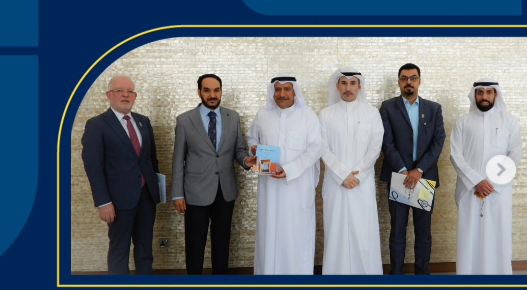
The Acting President of Kuwait University Prof. Nawaf Al-Mutairi received the Director General of the National Bureau for Academic Accreditation and Educational Quality Assurance, Dr. Jassim Al-Ali, on Monday morning, the 29th of April, 2024, at the university campus in Sabah Al-Salem University City - Al-Shaddadiya, regarding activating institutional accreditation within an academic vision in the general institutional framework in accordance with mechanisms and legislation that achieve quality and emulate what is done in prestigious international institutions. This was in the presence of the Acting President of Kuwait University, Prof. Nawaf Al-Mutairi, Director General of the National Bureau for Academic Accreditation and Educational Quality Assurance Dr. Jassim Al-Ali, Acting Secretary General of Kuwait University Prof. Fayez Al-Dhafiri, Acting Dean of Student Affairs at Kuwait University Prof. Jassim Al-Hamdan, Acting Vice President for Scientific Affairs Dr. Fahad Al-Fadhli, Acting Assistant Vice President for Planning at Kuwait University Prof. Haitham Lababidi, and a number of deputy directors and heads of departments at Kuwait University.
In this regard, the Acting President of Kuwait University Prof. Nawaf Al-Mutairi stressed the necessity of activating institutional accreditation and the quality of higher education in Kuwait, and the importance of starting to develop appropriate mechanisms for raising the academic classification of Kuwait University, and continuing constructive efforts between the Bureau and Kuwait University, noting that holding such discussions and fruitful meetings is extremely important to raise academic performance at Kuwait University locally and internationally in terms of academic accreditation.
The Acting Vice President for Academic Affairs Dr. Fahad Al-Fadhli added that the academic accreditation project for Kuwait University is part of the government’s work program to advance the academic and institutional aspects, as the university’s institutional accreditation was received from the Council of Public Universities, noting that earlier coordination had been made between the National Bureau for Academic Accreditation and Education Quality Assurance and Kuwait University to submit a proposed study on Standards for academic accreditation and quality of education in preparation for taking the appropriate decision in this regard by the Council.
The Acting Assistant Vice President for Planning at Kuwait University Prof. Haitham Lababidi said that on 12th of February 2022, the Office of the Vice President for Planning recommended starting the procedures for requesting institutional accreditation. He stated that there are many recommendations that came out previously from Kuwait University regarding the academic accreditation project, stipulating that the equivalent of 70% of the programs be accredited within the four years, and that projects that have not been academically accredited will be institutionally accredited with the aim of academic excellence and quality, which gives the student the opportunity to transfer to any other university.
The Director General of the National Bureau for Academic Accreditation and Educational Quality Assurance, Dr. Jassim Al-Ali gave a visual presentation that included introducing the Bureaue's role in evaluating the programs of higher education institutions in the State of Kuwait, which aims to raise their standards and begin the process of institutional accreditation for Kuwait University. He said, “I am happy today to be in my first home, which is Kuwait University, and there is no doubt that the country is seriously concerned with the quality of education, so it has directed all government agencies towards academic accreditations, whether in public or private education institutions.”
Dr. Al-Ali pointed out that several topics were presented that reflect the importance of improving the quality of academic programs in higher education institutions, and renewing and evaluating higher education institutions in other countries, indicating that the goal of quality in education is to develop a high-quality educational environment while developing quality measurement processes in education, and that the quality of education and the government's action programs seek to launch a general classification list for academic institutions and local higher education institutions within the general national framework for academic qualifications.
He added that academic accreditation is a type of quality assurance process according to which the services and operations of educational institutions or programs are provided by an external body. The steps of institutional accreditation were introduced through providing training services and forming a team of qualified evaluators, in addition to that the institutional accreditation cycle was discussed at NBAQ, which consists of nine stages with the aim of identifying areas in which the educational institution needs to improve its quality before the official accreditation visit, expressing his appreciation to the university administration for the positive meeting, which reflects Kuwait University’s keenness on its pioneering role in activating the university’s academic accreditation and starting to develop appropriate mechanisms for that.
On the sidelines of the meeting, the floor for inquiries and questions was opened to respond to all the various questions by the university administration, and about the process of annual evaluation of students and whether it is possible that it will reflect negatively on their university performance, which relates to self-evaluation, in addition to asking special questions related to fees, and the findings of the ongoing meetings by the national agency regarding the accreditation of military and police science institutions by higher education and others.


 Colored
Colored Grayscale
Grayscale

